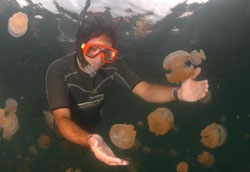Q and A with USAID's science chief Dr. Alex Dehgan
May / June 2011 | Volume 10, Issue 3
Dr. Alex Dehgan is the science and technology adviser to the United States Agency for International Development (USAID) Administrator. A biologist by training, Dehgan has also worked on science diplomacy issues with the Muslim world at the Department of State and on biodiversity conservation issues in Afghanistan with the Wildlife Conservation Society. During a recent visit to Fogarty, he proposed a new working group to develop joint projects for collaboration between USAID and NIH. Here are some of his comments:

Photo courtesy of USAID
A trained biologist, Dehgan’s career has
required deep immersion in global issues.
GHM: You’re the first scientific adviser at USAID in 20 years. What role does science have in development?
AD: USAID is a technical agency. Science is necessary, not necessarily sufficient, but necessary for what we do. We use science as a way of understanding problems that we face or to achieve the solutions to the problems that we face, so part of my mission has been restoring science to its rightful place. The basic strategy is threefold: a catalyst to incur change within the agency, a cheerleader for those doing good things for science and a customer service agency, to help people solve problems, being of benefit to people.
GHM: Can science further global health diplomacy?
AD: We’re trying to make opportunities to leverage scientific expertise to benefit people overseas. The challenges we face are the same challenges faced by the developing countries. If we want to affect national security we have to use all the tools of our greatness. We need to harness our creativity, not only to bring out the best in Americans but the best in the developing world. There are great benefits to investment in global health because they are investments in development. They help strengthen fragile and failing states. They promote economic advancement by reducing the burden of disease. Also, we’re aiming to build scientific capacity for people in developing countries so they may solve their own problems. This serves a diplomatic function but also a development function. And development is the foundation upon which you can build better political relations. It all starts with science.
GHM: What benefits could there be from international research collaboration?
AD: Only partnerships are able to take on one of the biggest health challenges we have. The cost of disease affects all countries; it doesn’t respect political boundaries. And in an increasingly interconnected world, it affects us at home as much as it affects developing countries abroad. Improving the health of those in Madagascar can also help improve the health of people in Oklahoma. We must leverage the great ideas from developing countries to find new solutions. Fundamentally, we must connect the unconnected. How do we bring the tools of better health to people whether they’re in a hospital or a hut.
GHM: What are your goals at USAID?
AD: Through President Obama’s Global Health Initiative we’re trying to work more productively with our sister agencies. We are in discussions with NIH and CDC about how we can work better together to bring research to the field. One example is the Helping Babies Breathe program with USAID, the National Institute of Child Health and Human Development and other partners. But we’re also trying to develop partnerships with the Agriculture Department and the Environmental Protection Administration because the problems of global health involve climate change and nutrition. We also want to leverage the great resources in academia. I’ve told the USAID administrator, "I’ve seen the future of development and we’re not in it." So we need to take advantage of the innovations coming out of universities. We need tools to help fight disease, no matter where it is, and to empower people around the world to join that fight.
To view Adobe PDF files,
download current, free accessible plug-ins from Adobe's website.